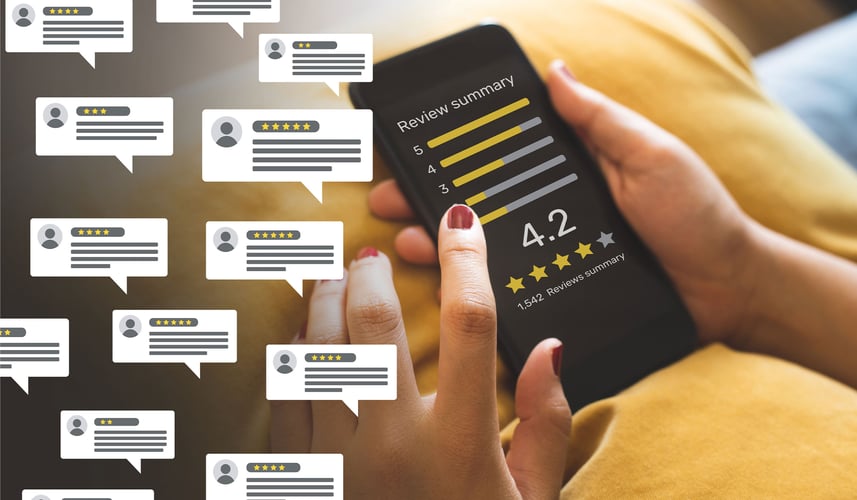Episode 38 - How Your Bank or Credit Union Should Handle Fraud or Spam on Social Media


Don't Miss An Episode, Subscribe Now

A financial institution affiliated with the local college is running a giveaway for football tickets through a social media contest. But a scammer has targeted their social media contest and attempts to hijack this contest by commenting with a copycat page, directing people to a fake website asking for their personal information. The FI GROW team discusses how they took action to prevent further damage.
Tune-in for best practices on handling spam or fraud attempts on your bank or credit union's social media accounts.
Transcription:
If you're looking for best practices for your bank or credit union, join us while we talk all things sales, marketing, and strategy for financial institutions. Let's make it happen with FI GROW Solutions..
Meredith Olmsted:
Hi there. I'm Meredith Olmsted, CEO and Founder of FI GROW Solutions. We are a digital marketing and sales consulting agency, and we work exclusively with banks and credit unions. And I am here with our Digital Ads Manager, Ida Burr. Say hi, Ida.
Ida Burr:
Hey everyone.
Meredith Olmsted:
And we were just having a really awesome conversation about problems on Facebook and social media in general in terms of spam. And so I wanted to hit record with Ida because she had some really, really good suggestions for how she's been handling some of these issues with our current clients, so I just wanted to talk a bit about it. One of the things I wanted to just point out as we're starting is that basically we really still think... Look, organic reach on social is basically nonexistent, but within a paid capacity and when you're supporting organic efforts with some paid ads, social is still great to engage with existing customers and existing audiences and potential new customers and even new audiences when you're reaching out with targeting with paid ads. It is really good for engagement. It is, or can be. And it is really good to stay top of mind with your existing audiences.
That's how we think about the bigger picture role for social. But what we really do want to remind people of is that you absolutely have to have a plan of action for dealing with negative comments, spam, fraudulent behavior, somebody trying to hijack a contest. These kind of things, they do still happen. We don't think it's bad enough at this point that you should get off social or stop posting or stop running contests all together, but we do want to talk a little bit about how to manage some of these situations. Ida, how did this come up for you? What's been going on that you've been dealing with?
Ida Burr:
We have a client who does a lot of contests around the local college. They're very affiliated with them, so they give away a lot of tickets to their games. And right now is football. They're giving away a lot of football tickets. It seems like somebody targeted their page, realized that they're doing all these contests and hijacking the contests and trying to direct people to a fake website. And then asking for personal information, which obviously is very concerning for us and the client.
Meredith Olmsted:
Right.
Ida Burr:
We've been managing this and trying to find the best way to just continue to be able to have these fun contests safely.
Meredith Olmsted:
Right, so the first thing obviously is find this fraudster or find the fake profiles, find the user, figure out who they are basically.
Ida Burr:
Yes.
Meredith Olmsted:
They can be people who've created a fake Facebook page to look like your institution.
Ida Burr:
Yes.
Meredith Olmsted:
Or they might sometimes create a really simple landing page on an easy to access Google hosting site or Sidey website pages, or even Wicks or something like that. Would actually go in, build a landing page, scrape the financial institution's logo, and try to pretend like they're that institution. The first thing you got to do is you got to find them on these different networks and figure out where all of this is going on. Then what do you do?
Ida Burr:
Yeah, definitely. Once you find it, which we always keep a close eye on our clients' pages. Once we started seeing these comments, you can hit the three little dots next to the comment and you can say, ban this user. When you ban a user, that automatically blocks, hides all their comments, so that gets all the comments. Then you go to the Facebook page, you report a page as they're impersonating a business-
Meredith Olmsted:
Okay.
Ida Burr:
... and you can send that report directly to Facebook. From there you figure out what they're doing. Sometimes they may just be, message us or comment, like our page, or whatever it may be-
Meredith Olmsted:
Right.
Ida Burr:
... but if they do have a link to another website, go to that website and figure out how to report the website page to whoever that vendor is, however they made the website [inaudible 00:04:46]-
Meredith Olmsted:
The host. Yeah.
Ida Burr:
Yes, the host. And that is covering all the bases of making sure that all the content that they've created is getting taken down.
Meredith Olmsted:
How long does it usually take for that process to run its course, for you to find them and then report it and have the fraudulent or the fake content removed?
Ida Burr:
The websites surprisingly come down very quickly.
Meredith Olmsted:
Okay.
Ida Burr:
I think the websites, they're very diligent with looking at reports for spam.
Meredith Olmsted:
Okay.
Ida Burr:
Facebook, on the other hand, can sometimes take a little bit. Sometimes you have to get a couple of people to report the profile as well.
Meredith Olmsted:
Okay.
Ida Burr:
But banning that profile from the page is just as good as... Well, almost as good as getting rid of it completely because then they can't post and can't interact with your followers anymore.
Meredith Olmsted:
Okay. Besides handling those situations right in the moment, what kind of preventative things can people do if they want to run a contest or do something that's a little bit more interactive or might get a little bit more reach than the average post? Maybe something you're going to turn into an ad and reach thousands of people.
Ida Burr:
Yeah.
Meredith Olmsted:
What can they do to prevent some of this before it even happens?
Ida Burr:
Now, we've started adding right to the contest in the post, we take your privacy extremely serious. We will never ask you for any personal information when collecting the prize.
Meredith Olmsted:
Okay.
Ida Burr:
The only thing we need to know is where you want to pick your prize up. Or the only thing we need to know is your phone number so we could call you. Or being very transparent with what you're going to ask for if they turn out to be the winner.
Meredith Olmsted:
Okay.
Ida Burr:
Another thing you can do is if you go into your page settings for your Facebook page, you can actually exclude certain terms from being commented, so comments like-
Meredith Olmsted:
Oh, interesting. To be put in a user's comments?
Ida Burr:
Yes.
Meredith Olmsted:
Okay.
Ida Burr:
If somebody posts these comments, it automatically hides the comment.
Meredith Olmsted:
Oh.
Ida Burr:
To the person, it looks like it posted, but nobody else is going to see it.
Meredith Olmsted:
Okay.
Ida Burr:
We've been adding things like visit this link. Click here. You're the winner. Congratulations, you won. Things like that. Adding those terms to just block anybody trying to navigate somebody to a different website, because in my opinion, there's no reason a member should be encouraging people to visit a website.
Meredith Olmsted:
Right.
Ida Burr:
You can do this if you go into your settings. You go into public posts.
Meredith Olmsted:
Okay.
Ida Burr:
And you navigate to content moderation.
Meredith Olmsted:
Okay.
Ida Burr:
And there's a big section that says, choose a list of words, phrases that you want to hide from your page.
Meredith Olmsted:
Okay.
Ida Burr:
And there you can type... I think there's a thousand word... A thousand input limit.
Meredith Olmsted:
Okay.
Ida Burr:
You could say a thousand phrases or a thousand single words, so pretty much endless. You can enter different terms in there that you think would not be in your page's best interest if people started talking [inaudible 00:08:17].
Meredith Olmsted:
Gotcha. Okay, that's cool. I didn't know that. That's a good thing. That's a nice way to be able to pre-filter people's comments who might, even if it's not super fraudulent or they're just trying to get links to their website for lack links or something like that, that's a good way to keep those kinds of posts from going live.
I know we've also recommended sometimes to clients, "Hey, let's take a break for a few weeks from contests." I mean, we do sometimes also do contests where you don't have to do it out on social. I mean, it's great to have it on social because it provides engagement, but if you are trying to target existing customers or an existing audience list or member list via email, you could always run the contest internally rather than have it public facing on social-
Ida Burr:
Mm-hmm.
Meredith Olmsted:
... to a take a break, right, from running these big kinds of contests?
Ida Burr:
Yeah. This client that we have now, their last giveaway was the biggest one. They're including a bunch of extra things and they're picking one big winner versus a couple of smaller winners.
Meredith Olmsted:
Mm-hmm.
Ida Burr:
And we suggested that they migrate this to a landing page. And you could still post it on Facebook.
Meredith Olmsted:
Okay.
Ida Burr:
But then you don't have this list of-
Meredith Olmsted:
Entries.
Ida Burr:
... comments-
Meredith Olmsted:
On Facebook.
Ida Burr:
... on Facebook that somebody could then target.
Meredith Olmsted:
Okay.
Ida Burr:
Hopefully you get a majority of your entries on the website and you get a few comments on the post-
Meredith Olmsted:
Gotcha.
Ida Burr:
... and then it's not as appealing for somebody to try to hijack it.
Meredith Olmsted:
Yeah, so it's less engaging on Facebook-
Ida Burr:
Mm-hmm.
Meredith Olmsted:
... but you can still do the giveaway. You just drive people to your own digital asset, which is your website basically.
Ida Burr:
Yeah.
Meredith Olmsted:
It's like a little bit of a loophole you might not get... You'll be able to have some of the engagement and the giveaway with your existing audience or your customers and you'll have some reach on social, but it's not quite as interactive.
Ida Burr:
Yes, exactly.
Meredith Olmsted:
Gotcha. Okay, cool. Awesome. Well thank you so much for the tips, Ida.
I think it is really important to still stay... I mean, you're finding though, even with some of these challenges, is the client or are these institutions still feeling like they're getting value from contests or from doing this effort on social?
Ida Burr:
Oh, absolutely. And we're able to stop the person from reaching out to people pretty quickly. This client was like, "We don't want to stop. Let's figure out another way to do this." It is a great opportunity to give back to your members and your followers.
Meredith Olmsted:
Yeah.
Ida Burr:
Absolutely still worth it.
Meredith Olmsted:
Okay, cool. Awesome. Well thank you so much and hopefully you guys have gotten some good tips here. If you're interested in any more about paid ads on social or digital in general, we have lots of great podcasts on those and other content blogs and case studies on our website at figrow.com. And in the meantime, let's just all get out there and make it happen.








Blog comments